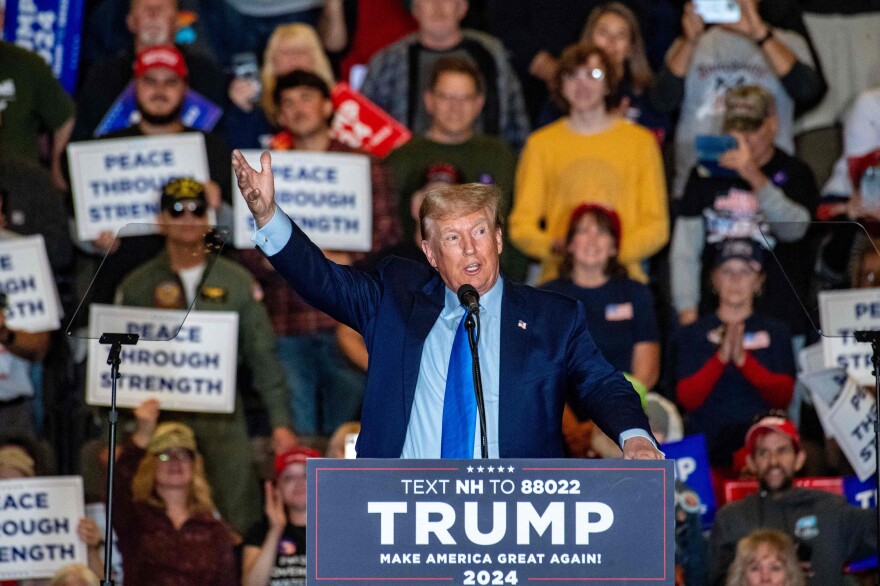A version of this piece originally appeared in the NPR Politics newsletter. Sign up for the newsletter here for early access and for more 2024 campaign coverage.
Vowing to "root out" and crush political critics, likening them to "vermin" and calling yourself a "proud election denier" is the kind of dehumanizing language usually reserved for dictators, tyrants and strongmen.
That's exactly what former President Donald Trump did over the weekend, but you likely won't hear anything about it from Trump's rivals.
Not even the Top 2 who want to dethrone him and whom Trump has given diminutive nicknames — Ron "DeSanctimonious"/"DeSanctus" a.k.a. Florida Gov. Ron DeSantis, or "Birdbrain." The latter is a fairly new one Trump is using for his former U.N. Ambassador Nikki Haley since her rise in the polls in recent weeks.
The Republican presidential candidates don't strongly take on Trump about the 91 felony counts he faces for fear of awakening the hornet's nest of vindictiveness that the Trump base can unleash. That leaves Trump free to say and do what he wants — no matter how extreme.
The GOP field is dwindling: South Carolina Sen. Tim Scott bowed out this week following Pence's exit a week earlier. The next Republican debate stage, in less than a month in Alabama, will likely be even smaller.
While that may help the DeSantis and Haley stand out, the clock is ticking for them to start really making up ground.
That's because Trump has a pretty big cushion. He has not just a 40-percentage point lead in national polling for the GOP nomination, but he's ahead by almost 30 points in Iowa, New Hampshire and South Carolina.
As a result, Trump is largely focusing on his legal troubles, and attempting to turn that in his favor. He wants the federal trial he faces to be on camera, something federal prosecutors are very much against, fearing that Trump could turn the trials into a "carnival" in an effort to "try his case in the courtroom of public opinion and turn his trial into a media event."
Trump hasn't made any bones about the fact that he wants to do exactly that. He wants to stay in the limelight and play the victim, as he has since he got on the national political stage.
And he's doing that without much criticism from his rivals, who are busy targeting each other — and running out of time.
Data points

$1 million
Nikki Haley and Ron DeSantis' campaign teams said they each raised more than $1 million in the 24 hours following the third GOP presidential debate on Nov. 8.

8-0
Democrats are defending eight Senate seats now that are either toss-ups, leaning in a direction, or — in the case of Sen. Joe Manchin's West Virginia seat — already solidly in the Republican column, according to the Cook Political Report.
On the other hand, there are zero Republican seats (yes, zero) in the toss-up or lean columns. In all, Democrats are defending 23 seats, compared to 11 for Republicans, highlighting how hard it will be for Democrats to retain control of the Senate, especially with Manchin's retirement and their current one-seat majority.
On the trail
Republicans:
Doug Burgum: He's vowing to "absolutely, positively" stick it out through Iowa and New Hampshire, despite not even qualifying for the third GOP presidential debate (he likely won't make the cut for the upcoming fourth, either).
Ron DeSantis: In another attempt to channel his governorship into his presidential run, DeSantis signed legislation to sanction Iran and protect Jewish institutions in Florida.
Nikki Haley: Haley's campaign is making a $10 million ad buy in December, which her team says is more than five times greater than DeSantis's ad reserves for that same time frame.
Vivek Ramaswamy: He's (finally) moving staff from suburban Ohio to Iowa and New Hampshire. He's also out with a dramatic ad criticizing DeSantis and Haley as war mongers, intersplicing images of George W. Bush and Dick Cheney with his rivals.
Democrats:
Dean Phillips: CNBC reports that Democratic financial donors who once supported Minnesota Congressman Dean Phillips' primary bid are now backing out, demanding that he return their donations or make sure the money won't go toward campaign funds. It's a sign of a growing anger in the party establishment over Phillips' campaign, which could threaten Biden's standing in the race.
Joe Biden: President Biden is in campaign mode. At a UAW event last week, Biden touted himself as a stronger supporter for manufacturing jobs than Trump. Then, at a reception in Chicago, he told guests that Democrats won the Nov. 7 election because "the Biden-Harris agenda has taken hold."
With research and reporting from Jeongyoon Han, NPR editorial assistant contributed to this story
Copyright 2023 NPR. To see more, visit https://www.npr.org.




